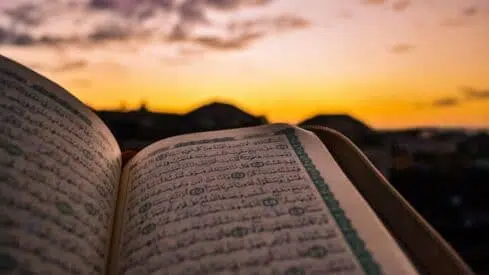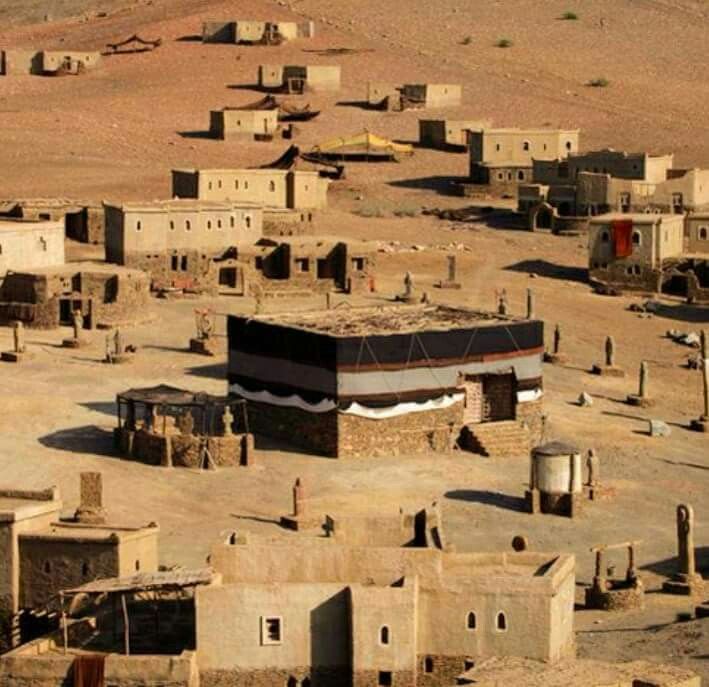
DEATH OF ABU TALIB AND KHADIJAH

Soon after the end of the boycott, in the tenth year of his mission, the Prophet (r) lost his
uncle, Abu Talib and his loving wife, Khadijah.
Both were his protectors, tried and true helpers and devotedly attached to him.
Their deaths meant a great loss to the Prophet (r) who at that time was already destined to encounter as many adversities in succession soon thereafter.
SPARKLING ELOQUENCE OF THE QUR’AN

Tufayl Ibn ‘Amr al-Daust was a prominent poet honored by the Arabs.
When he came to Makkah, some of the Quraysh warned him against meeting the Prophet (r). They told him, as usual, that Muhammed had created dissension among the Quraysh and so he had to be careful lest he should also fall under the Prophet’s evil spell.
Tufayl relates:
“By God, they were so insistent that I decided not to listen or speak to him. I went as far as to stuff cotton in my ears before going to the holy mosque. Accidentally, my eyes captured the Prophet who was offering prayer near me. I stood by his side and thus God caused me to hear something of his speech. It was beautiful and noble. I thought, that my mother might curse me, for I am a poet and the connoisseur for nothing good or evil in a speech can elude me. Why should anything prevent me from listening to his speech? If it is good, then I shall accept it, but if contrarily bad, I shall reject it.”
He met the Prophet (r) at his house where he invited him to accept Islam and recited the
Qur’an to him.
Tufayl embraced Islam and went back to his tribe determined to preach the faith of God.
He refused to do anything with his household members until they had also acknowledged God and His Prophet (r). All of them became Muslims and Islam spread thereafter in the tribe of Daus.
Abu Bakr used to pray within his house.
Not being satisfied with it, he further selected a place in the courtyard of his residence where he started offering prayers and reciting the Qur’an.
Abu Bakr was tenderhearted and when he recited the Qur’an, shedding tears all the while, youths, slaves and women used to gather around him listening to his recitation.
Now, the Qurayshite chiefs got alarmed at Abu Bakr’s open recital of the Qur’an so he sent for Ibn al-Dughunna who had pledged protection for him. When Ibn al Dughunna came, they said to him,
“We accepted your pledge of protection for Abu Bakr on the condition that he prays inside his house but he has started praying and reciting in the open. We fear he might seduce our women and children. Now, if he agrees to offer his prayers secretly within his house, it is well and good, otherwise he should avert your protection. We neither want to make you break your word nor can we allow him to do it openly.”
Ibn al-Dughunna informed Abu Bakr of what he had been told by the Quraysh, but he replied,
“I renounce your guardianship; I am contented with the protection and custody of my Lord.” (Al-Bukhaari, On the authority of ‘Aisha, Chapter. Hijrah.)
Journey to Taif

The death of Abu Talib signaled the beginning of a difficult period for the Prophet (r).
None of the Qurayshites dared touch the Prophet (r) during the lifetime of Abu Talib, but
now the restraint was gone.
In one instance, dust was thrown over his head.
And to make matters far worse, the Quraysh, moved by the desire to impose themselves upon the Prophet (r), insulted and mocked at him and made caustic remarks on Islam.
When the pagans persisted with their mockery and sarcasm as well as resolute behavior, the Prophet (r) thought of going to Ta’if to seek the help of the tribe of Thaqif.
The Prophet (r) intended to invite them to Islam for he believed that they would receive his message with sympathy. His expectation was apparently well grounded as he had spent his childhood with Bani S’ad who were settled near Ta’if.
Ta’if was a delightful city, second only to Makkah in its population and prosperity, holding
an important position in the Peninsula as alluded to in this verse of the Qur’an.
“And they say: If only this Qur’an had been revealed to some great man of the two towns?” (meaning: Makkah and Ta’if) [Qur’an (43:31)]
Taif was also a religious center since pilgrims from every part of the country visit its socalled
“Temple of al-Lat” and thus, it competed with Makkah in such respect for the latter housed Hubal, the chief deity of Arabia.
Ta’if was, as it still is today, the summer resort of the Makkan aristocracy. An Umayyad poet, ‘Umar Ibn Rabi’a said about his beloved:
“Winter in Makkah, living in clover, In Ta’if she spends the summer.”
The inhabitants of Ta’if, endowed with diversified large farms and vineyards, were wealthy
and prosperous. They had become conceited and boastful embodying the following description of the Qur’anic verse:
“And we sent not unto any township a Warner, but it’s pampered ones declared: Lo! we are disbeliever’s in that which ye bring unto us. And they say: We are more (than you) in wealth and children. We are not the punished!” [Qur’an (35:34-5)]
In Taif, the Prophet (r) first met the chiefs and leaders of Thaqif whom he invited to accept Islam. They were, however, rude and discourteous in their treatment of the Prophet
(r).
Not being content with their insolent reply, they even stirred up some gangs of the town to harass him. These riff-raffs followed the Prophet (r), abusing and crying and throwing stones on him, until he was compelled to take refuge in an orchard.
The Prophet (r) consequently had to endure even more obstacles in Ta’if than he had to face in Makkah.
These ruffians, based on either side of the path, threw stones at him until his feet were
injured and smeared with blood.
These oppressions grievously dejected the Prophet (r), whereby being in such a state of depression, a prayer citing his helplessness and pitiable condition and seeking the aid of God spontaneously came thru his lips:
“O Allah”, said the Prophet (r), “To Thee I complain of my weakness, resourcelessness and humiliation before the people. You art the Most Merciful, the Lord of the weak and my Master. To whom wilt You confide me? To one estranged, bearing ill will, or, an enemy given power over me? If You art not worth on me, I care not, for Your favor is abundant upon me. I seek refuge in the light of Your countenance by which all darkness is dispelled and every affair of this world and the next is set right, lest Your anger should descend upon me or Your displeasure light upon me. I need only Your pleasure and satisfaction for only You enablest me to do good and evade the evil. There is no power and no might save in thee.”
The Lord then sent the angel of mountains who sought the Prophets (r) permission to join
together the two hills between which Ta’if was located but the Messenger of God (r) replied, “No, I hope God will bring forth from their loins people who will worship God alone,
associating nothing with Him.” (Muslim, Kitab-ul-Jihad).
Moved to compassion by the grief of the Prophet (r), ‘Utbah and Shayba Ibn Rabi’a sent for ‘Addas, one of their young Christian slaves, and told him to take a bunch of grapes on a
platter for the Prophet (r) to which the bondman obeyed.
While in the Prophet’s presence, Addas observed his kind demeanor that compelled him to talk to him and instantly professed his faith in Allah and His Prophet (r).
The Prophet (r) then returned to Makkah where the Quraysh were as bitterly opposed to him as ever, deriding, annoying and assailing him day after day.
The Ascension

It was during this period that the Prophet (r) found himself
transported at night to the Ka’bah and from there to the place in Jerusalem, where Masjid-ul-Aqsa now stands.
Then he was borne to the celestial regions where he witnessed the seven heavens, met the Prophets of yore and saw the remarkable signs of divine majesty about which the Qur’an says:
“The eye turned not aside nor yet was overbold, verily he saw one of the greater revelations of his Lord.” [Qur’an (53:17-8)]
Occurrence of the event at that time was meant to confer dignity upon the Prophet (r)
;it signified something like viands of higher regale in order to console and alleviate the feelings of distress caused to him by the persecution of the pagans at Ta’if.
After the Ascension incident, the Prophet (r) told the people about his nocturnal journey, but the Quraysh mocked him and shook their heads stating that it was inconceivable and beyond the bounds of reason.
When Abu Bakr (t) saw the Quraysh accusing the Prophet (r) of falsehood he said,
“What makes you wonder about it? If he said this, then it must be true. By God, he tells me that the revelation descends upon him from Heaven in a flash or in an instant during the day or night and I testify for him. This is even more unimaginable and difficult than what seems to astound you.”
REAL SIGNIFICANCE OF ASCENSION
The ascension did not occur in a routine or ordinary run of things only to demonstrate the
profound phenomena of the Kingdom of God in the Heavens and the earth to the Prophet (r) of Islam.
More than that, such a prophetic journey of tremendous importance alludes to a number of other significant and complex realities of far-reaching concern to humanity.
The two Soorahs of Isra and An-Najm revealed in connection with this heavenly journey indicate that Muhammed was charged with the office of Prophethood for both the Houses of God, those in Jerusalem and Makkah, and was sent as the leader of the east and the west or the entire human race ‘til the end of time.
As the inheritor of all the Prophets of old, he represented the fulfillment and consummation of mankind’s religious development.
His nightly journey from Makkah to Jerusalem expresses, in a figurative way, that his personality conformed and alluded to the oneness of Bait-ul-Haram (K’aba at Makkah) and Masjid-ulAqsa in Jerusalem.
That all the Prophets arrayed themselves behind him in Masjidul-Aqsa shows that the doctrine of Islam, preached by him, was final, universal and all comprehensive–meant for every class and section of human society throughout the ages.
The event is, at the same time, indicative of the comprehensiveness of the Prophet’s Prophethood
,the place accorded to his followers in the great task of humanity’s guidance and the distinctive character of his message.
The ascension of the Prophet (r) represents a demarcation line between the regional, limited and variable rules of divine guidance entrusted to the Prophets of old and the global,
comprehensive and abiding principles of faith conferred to the universal leader of human race.
Had the Prophet (r) been a sectional or regional guide, a national leader, the savior of any particular race or the restorer of the glory of any particular people
,there would have been no need to honor him with ascension to the heavens nor would he have been required to perceive the hidden phenomena of the Heavens and the earth.
Nor would it have been necessary to create a new link between the celestial and the earthly surface of the Divine Kingdom
; in that case the confines of his own land, his surroundings environs and the times would have been sufficient enough and there would have been no need for him to divert his attention to any other land or country.
Neither his ascension to the most sublime regions of the Heavens and to the “Lote-Tree of the Farthest Limit”
nor even the nocturnal journey to the far away Jerusalem, then in the grip of the powerful Christian Empire of Byzantium, would have been necessary at all.
The ascension of the Prophet (r) was a divine proclamation that he had nothing to do with the category of national or political leaders whose endeavours are limited to their own country and nation.
For they serve the nations and races to which they belong and are a product of their time, they serve the need of a particular juncture.
The Prophet (r) of Islam, on the contrary, belonged to the luminous line of the Messengers of God who communicate the inspired message of Heaven to the earth.
They are links between God and his creatures.
Their messages transcend the limitations of time and space, race and color and country or
nation, for they are meant for the exaltation of man irrespective of color, race or country.
OBLIGATORY PRAYER

On this occasion, God made fifty prayers a day obligatory for the Prophet (r) and his followers.
The Prophet (r) constantly implored God for the reduction of the burden of prayers until the Lord was also pleased to limit these to only five times daily.
The Lord was also pleased to declare that whoever properly performs these five times daily prayers would be recompensed for all the fifty daily prayers enjoined earlier. (Al-Bukhaari, Kitab-us-Salat)
for prophets stories visit https://sunofislam.com/prophetsofgod/
for scientific miracles articles visit www.sunofislam.com
